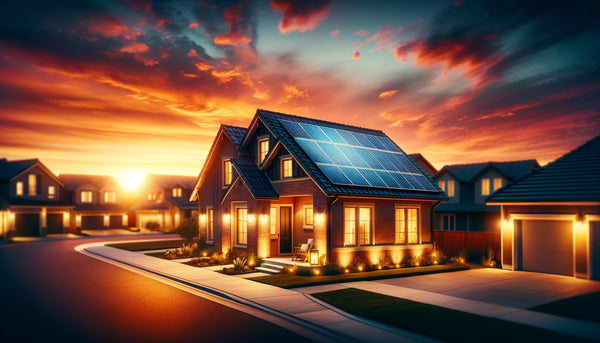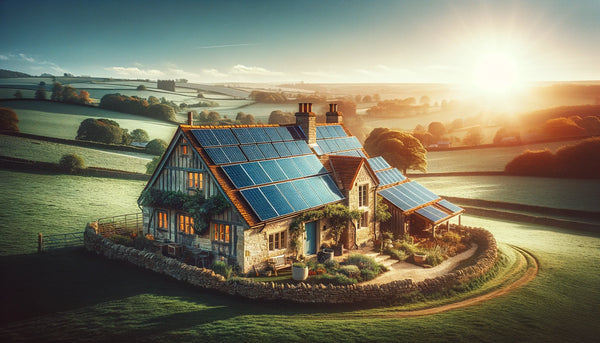In an era of climate change and rising energy costs, homeowners are increasingly turning to renewable energy solutions to take control of their energy future. Among these solutions, home solar panel systems stand out as a promising option. With advancements in technology and decreasing costs, solar panels are becoming more accessible and practical for homeowners around the world. This article explores the benefits and considerations of adopting home solar panel systems, empowering individuals to make informed decisions about their energy usage and environmental impact.
Table Of Content
- Harnessing the Power of the Sun: How Solar Panels Work
- The Environmental and Economic Benefits of Solar Energy
- Off-Grid Independence and Energy Security
- Factors to Consider Before Going Solar
- The Future of Solar Energy
- Conclusion
- FAQs

Harnessing the Power of the Sun: How Solar Panels Work
At the heart of a home solar panel system are photovoltaic (PV) cells, which convert sunlight into electricity through the photovoltaic effect. These cells are typically made of silicon and generate direct current (DC) electricity when exposed to sunlight. An inverter then converts this DC electricity into alternating current (AC), which can power household appliances and feed excess energy back into the grid.
The Environmental and Economic Benefits of Solar Energy
One of the most significant advantages of home solar panel systems is their environmental sustainability. Unlike fossil fuels, solar energy produces no greenhouse gas emissions during operation, helping to mitigate climate change and reduce dependence on finite resources. Additionally, solar panels have a minimal environmental footprint compared to traditional energy sources.
From an economic standpoint, investing in solar energy can lead to long-term savings on electricity bills. While the upfront cost of installing solar panels may seem daunting, homeowners can recoup their investment over time through reduced energy bills and potential incentives such as tax credits and rebates. In many cases, solar panel systems can also increase the value of a home, providing a favorable return on investment for homeowners.
Off-Grid Independence and Energy Security
One of the most appealing aspects of home solar panel systems is their potential to provide energy independence, particularly when combined with energy storage solutions such as batteries. By generating their own electricity, homeowners can reduce reliance on the grid and protect themselves against power outages and fluctuations in energy prices. Off-grid solar systems are particularly beneficial for remote or rural areas where access to traditional utilities may be limited or unreliable.

Factors to Consider Before Going Solar
While the benefits of home solar panel systems are undeniable, there are several factors to consider before making the switch. The suitability of solar energy depends on factors such as geographic location, roof orientation, shading, and local regulations. Before investing in solar panels, homeowners should conduct a thorough assessment of their property to determine its solar potential and any potential obstacles.
Additionally, it's essential to consider the upfront costs and financing options available for solar installations. While prices have declined significantly in recent years, solar panel systems still require a substantial initial investment. However, various financing options, including solar loans, leases, and power purchase agreements (PPAs), can help make solar energy more affordable and accessible to homeowners with diverse financial circumstances.
The Future of Solar Energy
As technology continues to advance and economies of scale drive down costs, the future of home solar panel systems looks increasingly promising. Innovations such as high-efficiency solar cells, integrated solar roofing materials, and smart energy management systems are making solar energy more efficient, affordable, and convenient than ever before.
Moreover, the growing focus on sustainability and renewable energy at the global level is likely to drive further adoption of solar energy solutions in the coming years. With continued support from policymakers, increased public awareness, and ongoing research and development efforts, home solar panel systems are poised to play a vital role in shaping a cleaner, more sustainable energy future for generations to come.
Conclusion
Home solar panel systems offer a compelling opportunity for homeowners to take control of their energy future while reducing their environmental footprint and saving money on electricity bills. By harnessing the power of the sun, individuals can achieve greater energy independence, resilience, and sustainability in their homes. While there are challenges and considerations involved in transitioning to solar energy, the long-term benefits far outweigh the initial investment. With advancements in technology and growing public awareness, solar energy is paving the way towards a brighter, cleaner, and more sustainable future for all.

FAQs
How do home solar panel systems work?
Home solar panel systems utilize photovoltaic (PV) cells to convert sunlight into electricity. This electricity can power household appliances and can be stored in batteries for later use.
What are the benefits of installing solar panels at home?
Installing solar panels at home offers environmental benefits by reducing greenhouse gas emissions and dependence on fossil fuels. It also provides economic benefits through savings on electricity bills and potential incentives such as tax credits.
Are home solar panel systems suitable for all homes?
While solar energy can be beneficial for many homeowners, factors such as geographic location, roof orientation, shading, and local regulations can impact the suitability of solar panel installations.
What financing options are available for home solar panel systems?
Homeowners have various financing options for solar panel installations, including solar loans, leases, and power purchase agreements (PPAs), which can help make solar energy more accessible and affordable.
What is the future of solar energy?
With advancements in technology and growing global focus on sustainability, the future of solar energy looks promising. Innovations such as high-efficiency solar cells and smart energy management systems are making solar energy more efficient and convenient.
You May Also Like
- The Impact of Home Solar Panels on Home Value
- Home Sweet Energy-Efficient Home: Making Your House Eco-Friendly
- The Benefits of Passive Solar Home Design
- The Importance of Landscaping for Home Energy Efficiency
- Energy-Efficient Home Design: Tips and Tricks

